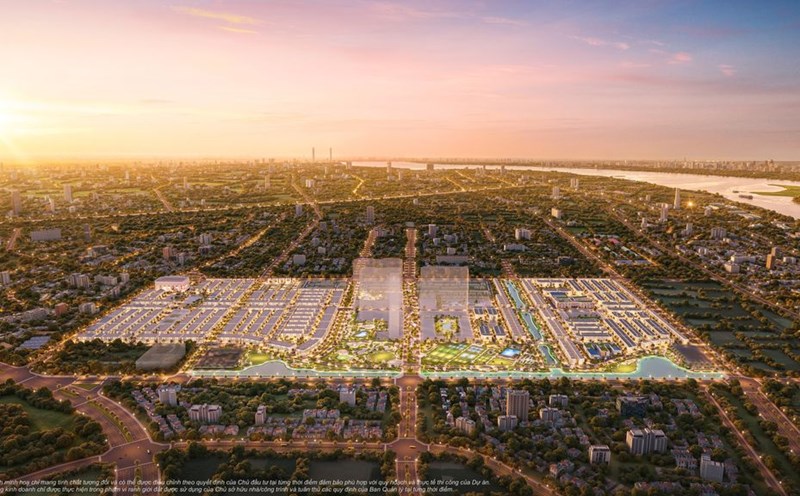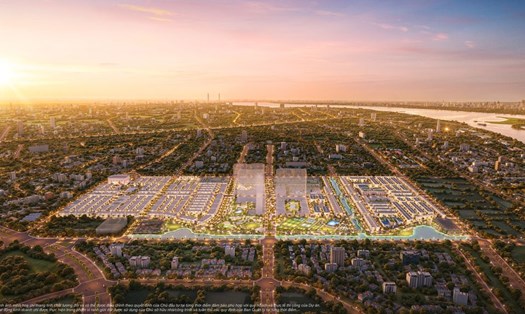Matureness through the "lets" of infrastructure
From a flight landing in the sky of Van Don to container trucks carrying frozen seafood soaring on the Western Expressway or a line of bon bon cars bustling on the elevated Ring Road 2 in the heart of Hanoi during the rush hour - Vietnam's infrastructure is changing every day. And the special thing is that that change comes from private resources.
When the state budget is no longer the only source of capital for infrastructure projects, a new wind has blown the picture of building "thousands of billions" of projects: the private sector enters a big game - their role is not only demonstrated in large-scale projects but also quickly contributes to solving strategic bottlenecks.
The Trung Luong - My Thuan Expressway, which has been stalled for nearly a decade, has been "revived" by private investors, shortening travel time from the West to Ho Chi Minh City, creating a development boost for the entire fertile Mekong Delta. In Hanoi, the elevated Ring Road 2 section from Nga Tu So to Minh Khai - a complex construction project in the heart of the city - was quickly implemented and completed thanks to the construction - transfer (BT) model, with investment capital from a private corporation.
In Quang Ninh, Van Don International Airport is not only a symbol of modern infrastructure, but also a testament to the fact that the private sector can completely undertake the construction of an international airport.
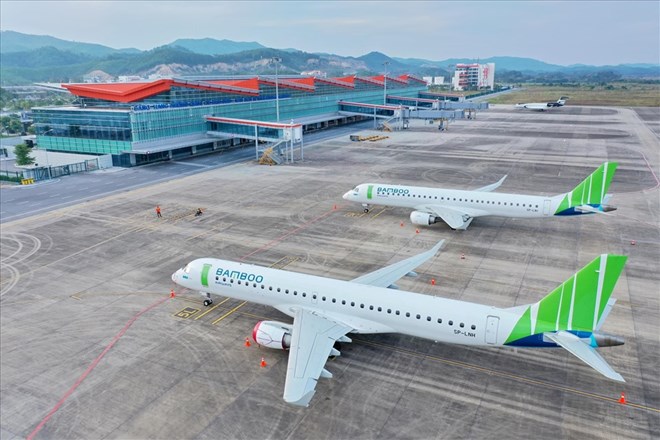
The above projects show an important movement taking place when the private economic sector: If given clear opportunities and legal corridors, they will not only complete large-scale projects but also open up development space, awakening the development potential of a land in a record short time.
The strength and ambition of the Vietnamese private economy is also reaching the sector that was once considered a state monopoly: the North-South high-speed railway. Major private corporations of Vietnam have also proposed and wished to participate in investing in developing the high-speed train model. What is noteworthy is that their plan not only proposes techniques or finance but also brings a completely different approach to the state: flexible, market-oriented and accelerated.
In a field that requires tens of billions of dollars in capital and a vision for the century, the participation of the private sector - if accepted - will be an institutional turning point, opening up the possibility of building "billion-dollar" infrastructure works in a faster, smarter way and less dependent on state mechanisms. Once again, the private sector cannot wait to be given a role - they proactively propose with the expectation of creating a development momentum in the spirit of national spirit.
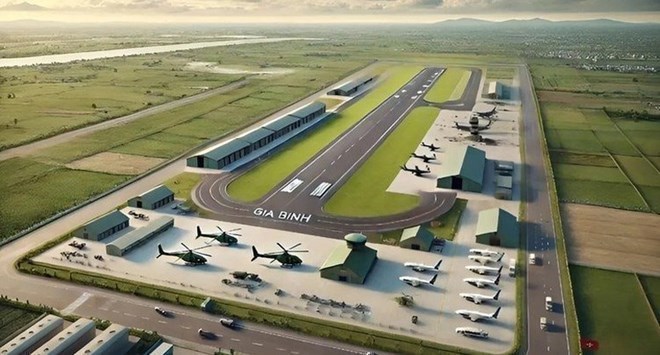
Vietnam's private economy: The mark of four decades
From an economic component that was not recognized 40 years ago, the private economy of Vietnam has transformed to maturity. According to the Statistical Year 2023, in the period of 2020-2023, the private economy contributed an average of 50.3% to GDP, higher than the state economic sector (20.87%) and the FDI sector (20.3%1). According to the General Statistics Office, the private economy solves the problem of employment for 82% of the workforce in the economy, contributing 30% of total budget revenue, accounting for 60% of total social investment capital. Not positioned as the locomotive for economic development, by 2015, private enterprises exceeded the state sector in terms of contribution to GDP.
Speaking at the seminar "Solutions to promote the private economy", Associate Professor T.S. Tran Dinh Thien, member of the Prime Minister's Research Advisory Group, said that when mentioning the role of the private economy, it is common to think about figures such as GDP proportion, exports, budget contributions... but these statistics do not accurately condemn the effectiveness of this component. Creating jobs and income for private society is paramount. This is the foundation for the country's development, he affirmed.
With the private economy, when given the opportunity with endogenous strength and flexibility, they have risen to become leaders in many economic fields. One of the most convincing examples is the private sector leaving a strong impression in the real estate sector. Major private corporations such as Masterise Group, Bitexco... have built iconic projects, completely changing the quality and services of the industry. They contribute to changing and beautifying the face of urban areas in big cities. The biggest difference that the private sector has made in the real estate revolution is the spirit of rapid implementation, quality, modernity, sustainability and aesthetics of the project.
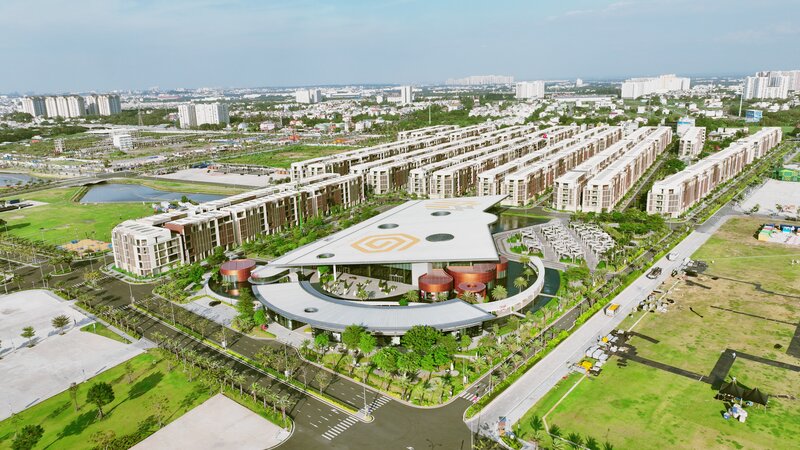
Summarizing the role of the private economy in the article: "Developing the private economy as a lever for a prosperous Vietnam", General Secretary To Lam assessed that the private economy of Vietnam not only helps expand production, trade and services but also contributes significantly to improving labor productivity, promoting innovation and increasing national competitiveness.
The strong rise of many Vietnamese private enterprises not only dominates the domestic market but also affirms the brand in the international market. This proves that if there is a favorable development environment, Vietnamese enterprises can completely reach out and compete fairly with the world, General Secretary To Lam wrote.
Development space leads to breakthroughs
The 13th National Party Congress determined a specific goal that by 2045, Vietnam will become a developed country with high income. With the development and rise in the past, the role of the private economy is recognized and assigned importance in Resolution No. 68-NQ/TW signed by General Secretary To Lam marking the most strong turning point in the market economy ever: "In the socialist-oriented market economy, the private economy is the most important driving force of the national economy". At the seminar "Solutions to promote the private economy", Dr. Can Van Luc, Chief Economist of BIDV Bank, acknowledged that now is the breakthrough period of the private economy".
Dr. Vu Minh Khuong, lecturer at Ly Quang Dieu School of Public Policy, commented that at present, promoting the development of Vietnam's private economy shows three characteristics of breakthroughs.
First, it touches the desires of society, touches the concerns of many years so that the private economy can truly develop into a leading force.
Second, reflecting the trend of the times because only the private economy is sensitive enough to decisively grasp changes in technology and market structure to create turning points.
Third, the private economic sector has the ability to resonate and develop endogenously very high, has creative transformation, they are capable of creating a chain reaction, spreading to the entire economy.
At a time when Vietnam is restructuring its economy to implement strategic socio-economic goals with a vision to 2030 and 2045, the emergence of the private sector in the infrastructure sector shows even more breakthrough factors.
First, they do not invest in easy things - but choose to go to the biggest bottlenecks such as transport infrastructure, aviation, high-speed railways, where the desire of society has accumulated for many years but has not had a feasible solution.
Second, only the private sector is sensitive enough to see opportunities in major shifts in technology, markets and consumer behavior, thereby making quick decisions, designing flexibly and implementing decisively.
And finally, the private economy - when there is space for development - often generates a series of spillover reactions, connecting industries, stimulating innovation, creating jobs, and improving the quality of life on a broader scale.
The private economy has proven its creativity and endogenous resilience through clear contributions to the national economy. Over the past 40 years, from a lackluster role, gradually being recognized, this area has now become a pioneer force committed to many fundamental areas such as infrastructure. In the new era of national growth, whether the private economy has enough momentum to develop Vietnam into a powerful nation by 2045, this depends on the development space created by the Government.


